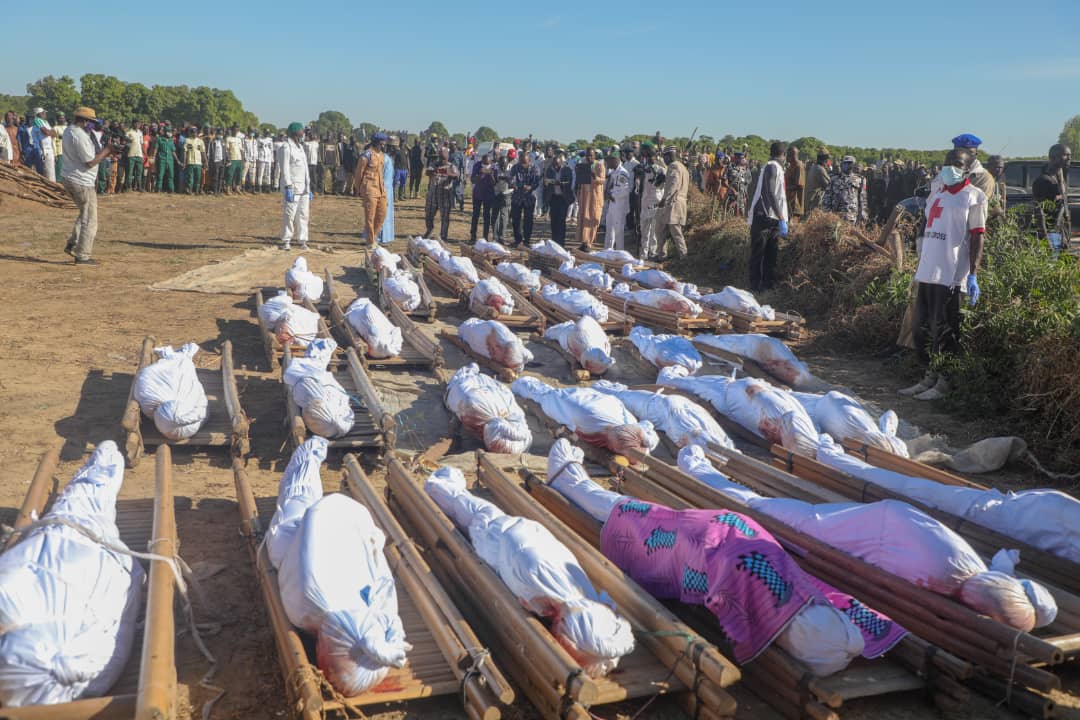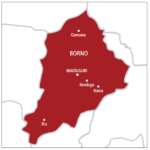The killing by Boko Haram insurgents eight days ago of several dozen farmers who were working on their rice fields at Koshobe village in Borno State was, even by Boko Haram’s atrocious standards, a historic new low in sheer depth of depravity. Forty-three victims’ bodies, many of them beheaded, were collected from the rice fields on Saturday, November 28 and were buried at the Zabarmari community cemetery, with Governor Babagana Zullum leading the mourners.
The exact number of victims was difficult to tabulate. United Nations’ Coordinator in Nigeria Edward Kallon at first said 110 people were killed. Even though many more remains were collected in later days and subsequently buried, this figure was revised downwards. This however did nothing to lessen the shock, national and international outrage at what happened. It was a grim reminder, if any was needed, that the insurgents are still around in all their dastardly cruelty, and that the war against them is far from being won despite all assurances over the years from top government officials and the military high command.
- Benue health commissioner buried
- Police in Benue arrest varsity student over alleged killing of don Arrest
Boko Haram claimed responsibility for the massacre and said it carried it out because, two days earlier, the locals captured an insurgent and handed him over to the security agencies. Everyone should have known that the insurgents would attempt a reprisal attack, as indeed the locals said they notified the military. They even said they reported insurgents massing in the surrounding bushes. Still, no help came when dozens of farmers were rounded up, herded into a spot, locked up, their hands tied behind their backs while they were slaughtered in turn.
The Presidency’s response to the Zabarmari outrage was an admixture of gaffes, goofs. President Muhammadu Buhari failed to go to Borno to condole with the state government and victims’ families. He instead sent a Federal Government team led by the Senate President. Next, the Presidency tried to push blame to the military, saying government had provided to it all the support it needed to defeat the insurgents. This is not true; the military is still far short of the manpower and strategic equipment needed to win this war.
Probably the worst gaffe was presidential spokesman Garba Shehu’s very unfortunate statement that the farmers went to the rice fields without obtaining clearance from the military. He thus blamed the victims for the tragedy, which he later tried to retract. The allegation by Defence Headquarters spokesman Major General John Enenche that the locals were not fully cooperating with the army also added salt to injury. After all, Boko Haram said it attacked them precisely because they cooperated with soldiers.
Borno State governor Zullum was so frustrated that he called on the Presidency to reengage the foreign mercenaries that helped to recapture several major towns from Boko Haram in early 2015, before the Buhari Administration disengaged them. We believe that this sensitive matter is not for public discourse. However, it is not out of place for government to seek technical, training and equipment assistance from various quarters around the world in order to bring this war to a quick end.
President Buhari is expected later this week to honour the House of Representatives’ invitation to address it on his response to the security challenges facing this country, of which Boko Haram is only the biggest one. We don’t expect him to reveal in public every security measure that the government is taking, but we expect him to unveil a very thoughtful and forceful response to the challenge. He has not yet accorded insecurity the priority it deserves in the scheme of things. Every other socio-economic policy will come to naught unless there is security of lives and property.
So far, President Buhari has rejected calls from many quarters, including from the Senate, to replace the military service chiefs. Replacing them alone will not solve all of our insecurity issues but it will afford new chiefs a chance to try new strategies and tactics and widen the president’s field of choice. If the Zabarmari events do not elicit the kind of prompt, total and decisive response from the Buhari Administration that brings this war to a quick conclusion and enables millions of IDPs to return to their homes, then the Administration and Nigeria as a whole are starring at the abyss.

 Join Daily Trust WhatsApp Community For Quick Access To News and Happenings Around You.
Join Daily Trust WhatsApp Community For Quick Access To News and Happenings Around You.


